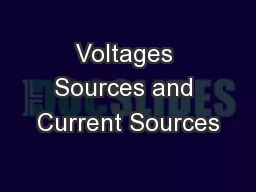PDF-Evaluating Sources
Author : piper | Published Date : 2021-09-22
Connors Writing Center Dimond Library 329 UNH writingcenterunhedu 6038623272The world is full of information however not all of it is valid useful or accurate When
Presentation Embed Code
Download Presentation
Download Presentation The PPT/PDF document "Evaluating Sources" is the property of its rightful owner. Permission is granted to download and print the materials on this website for personal, non-commercial use only, and to display it on your personal computer provided you do not modify the materials and that you retain all copyright notices contained in the materials. By downloading content from our website, you accept the terms of this agreement.
Evaluating Sources: Transcript
Download Rules Of Document
"Evaluating Sources"The content belongs to its owner. You may download and print it for personal use, without modification, and keep all copyright notices. By downloading, you agree to these terms.
Related Documents














